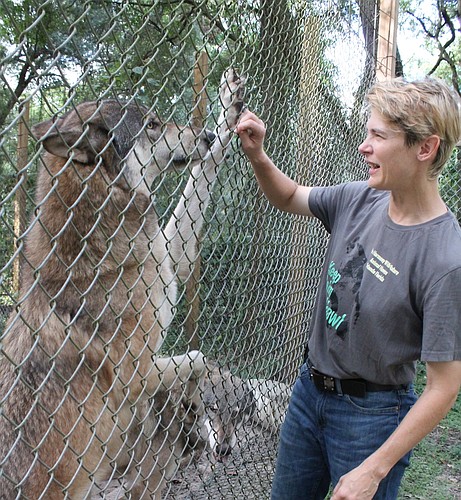- April 20, 2024
-
-
Loading

Loading

There are dog people, and then there are wolfdog people.
Kim Kapes, who is the main caretaker at one of Florida’s few wolf sanctuaries, can be described as a wolfdog person. It takes a passionate heart, observant mind and hardworking spirit.
Kapes moved to Florida from Virginia after retiring from her career as a firefighter. She started In Harmony With Nature as a refuge for birds and reptiles, but wolf sanctuaries around Florida kept inviting her to speak to their volunteers about human connections with animals. Then they started asking her to take in the wolves and wolfdogs they didn’t have room for.
“All the sudden, I blinked, and I became Orlando’s wolf lady,” Kapes said.
Kapes still cares for some tortoises, birds, pigs and cats, but the majority of the animals at IHWN are dogs and wolfdogs. Currently, there are about 15 wolfdogs and three pure wolves at the sanctuary.
All of the wolves and wolfdogs came from the exotic pet trade and were not in adequate or legal care. The goal is for the wolfdogs to eventually be adopted into permanent homes by qualified caretakers around the country. But while they are at IHWN, Kapes gives them as much personalized attention as possible.
It is important for the animals to have enrichment. Enrichment in regards to captive animals is the practice of switching up their routine by offering sensory stimuli that encourage safe, natural behaviors.
Around this time of year, the wolfdogs are easily pleased with donations of a popular decorative item.
“Everybody gets to play with the pumpkins,” Kapes said. “They roll them around, they chew on them, they play with them and it’s great.”
Kapes, who has also written a book about human-canine relationships, is always looking for opportunities to teach people about the values of connecting with animals.
“We humans have too big of an ego, and we think we’re here for them, and that we’re saving them. But honestly, they really are saving us,” she said. “Most people that have had a very important animal in their life, the connection is sometimes stronger than what they’ve had with people.”
IHWN is always in need of volunteers, whether they can offer their skills just once or long-term. Depending on his or her skills and interests, a volunteer might help with manual labor, cleaning, administrative work, digital marketing, grant-writing and more.
To learn more about becoming a volunteer, go to IHWN.org or email [email protected].
Kim Kapes is on the clock 24 hours a day, 365 days a year. A typical day’s work for her and her volunteers might call for:
— Prepare and distribute diets
— Brush dogs
— Take indoor dogs outside for exercise
— Complete nonprofit paperwork
— Pick up raw meat at the food bank
— Sort and freeze meat
— Purchase other supplies
— Clean, clean and clean again
— Check on the home environment of prospective adopter
— Give enrichment to the animals
— Prepare medical equipment for tomorrow
When it comes to wolf dogs, the general public sometimes makes assumptions that don’t hold up.
1. It would be cool to have a wolf as a pet.
Truth: It is illegal to have a wolf as a pet, but it is also unsafe for both the animal and the owner. Wild animals do not adapt easily to captive life. And if the animal is confiscated by the Fish & Wildlife Commission, it could be euthanized.
2. A wolf dog is half-wolf and half-dog.
Truth: Wolf dogs have varying compositions of dog and wolf genes. Some are 50-50, but others could be any percentage of wolf and dog.
3. A wolf that is kept outdoors in Florida will be too hot.
Truth: Wolves’ coats protect them from heat as well as cold. Wolves living in warm climates don’t build up the full winter coat that they would up north.
4. If it looks like a wolf, it must be part-wolf.
Truth: There are many dogs that might resemble wolves in some way but actually have no wolf in them. An easy way to make a distinction in many cases is the sound the animal makes. Wolves do not bark, Kapes said.
5. Wolves should always be released to the wild after they are rehabbed.
Truth: It is difficult for a wolf to survive without the support of a pack, and it is uncommon to find acceptance in a pack without blood relatives. After animals have learned to rely on human care, they often cannot survive in the wild.
Contact Catherine Sinclair at [email protected].